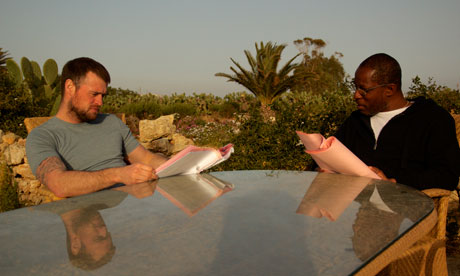
He was a little known 14-year-old sailor whose brutal ordeal aboard a whaling ship in the early part of the 19th century helped inspire Herman Melville's classic novel Moby Dick.
But now the experiences of the Nantucket seafarer Thomas Nickerson are to receive the recognition they deserve with a 90-minute drama called The Whale, which begins filming in Malta this week.
Young actor Charles Furness takes on the role of Nickerson in his first major part, with Robin Hood actor Jonas Armstrong playing first mate Owen Chase.
It was Chase's written account of the sinking of their ship, the Essex, that is widely acknowledged to have been the inspiration for Herman Melville's 1851 classic Moby Dick.
Described by the BBC as "one of history's greatest stories of survival at sea" the drama will be told through the eyes of the Essex's cabin boy Nickerson who, at 14, was the youngest member of the crew after it was sunk by a whale in 1820.
Nickerson and seven other survivors spent three months at sea before rescue, with some finding themselves on the Pacific Island Henderson and others resorting to cannibalism at sea.
Melville is widely believed to have read Chase's book about the sinking although he would not have read Nickerson's own account which was written 55 years later in 1876, just seven years before he died aged 78.
However the BBC will put the cabin boy at the centre of its own retelling of the events and is due to cast a well-known American actor in the role of the older Nickerson recounting his experiences.
According to the producers of The Whale, which is being made with the US broadcaster Discovery, Moby Dick is clearly inspired by many of the grisly experiences of the Essex crew as documented by Chase.
Melville's classic novel is narrated by a sailor called Ishmael and tells the story of Captain Ahab and his quest to enact revenge on a violent but enigmatic sperm whale which had destroyed his boat and bitten off his leg.
"Very few people will know that Moby Dick was directly inspired by this story, which was first told by Chase and which Melville would have read and we hope to tell it as excitingly as possible," said Eamon Hardy, executive producer of The Whale. "Nickerson's experiences were definitely recounted by Chase and would have contributed much to the classic that is Moby Dick."
The drama will also bring to light the importance of whaling in the age before petroleum.
"This was big business – at the time, whale oil was used all over the world," he said.
Martin Davidson, BBC History commissioner, added: "Throughout the narrative of this fascinating story some universal themes that everyone can relate to will be explored such as: what is man's place on earth? How does humanity relate to the planet and its creatures? And what lengths will man go to in order to survive? It is a thrilling tale."
• To contact the MediaGuardian news desk email editor@mediatheguardian.com or phone 020 3353 3857. For all other inquiries please call the main Guardian switchboard on 020 3353 2000. If you are writing a comment for publication, please mark clearly "for publication".
• To get the latest media news to your desktop or mobile, follow MediaGuardian on Twitter and Facebook

